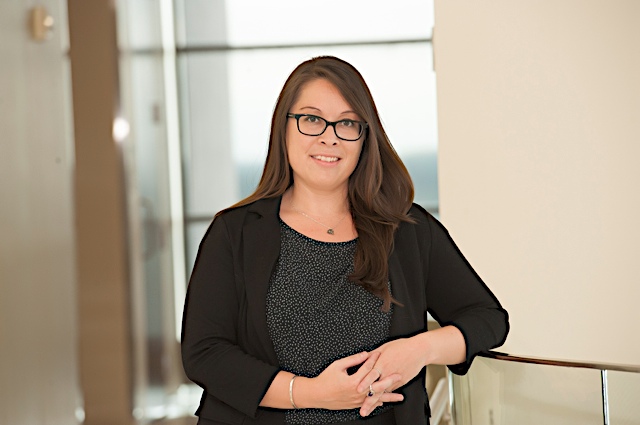Latest News
Research & Innovation
Clinical trial tests new lifestyle program aimed at addressing obesity in young men with obesity
May 25, 2021

oung men with obesity are at risk for developing a host of health complications, including cancer, heart disease and cardiometabolic disease. To better understand the behaviors that contribute to obesity in this demographic and identify solutions, researchers at VCU Massey Cancer Center are testing a new lifestyle program aimed at promoting weight loss, physical activity and healthy diet among males ages 18 to 35.
The program, called ACTIVATE, will be evaluated during a three-month behavioral clinical trial that launched in March 2021 through OPT for health, a research laboratory at the VCU School of Medicine that focuses on the prevention and treatment of obesity and related medical conditions such as cancer.

Jean Reading, M.A., a predoctoral fellow at Massey and doctoral candidate in the Department of Health Behavior and Policy at the VCU School of Medicine, is the student investigator studying the program as part of her dissertation.
“It has historically been challenging to recruit young men into behavioral weight loss programs, but when they do enroll, they experience a lot of benefits,” said Reading. “Our goal was really to think about how to design a weight loss program that has all the pieces known to work but packaged in a way that might be more appealing to young men.”
To develop ACTIVATE, Reading and her colleagues drew from a mix of qualitative research on young men and health behavior theory. The program builds on the work of Jessica LaRose, Ph.D., director of OPT for health and a member of Massey’s Cancer Prevention and Control research program.
LaRose, who is also an associate professor in the Department of Health Behavior and Policy at the VCU School of Medicine, is the principal investigator of the ACTIVATE trial and Reading’s dissertation chair. She has previously conducted several behavioral weight loss trials with young adults, and Reading credits LaRose’s work with this age group for leading the way on how best to approach young men.
“For the ACTIVATE trial, young men will be randomly assigned to two groups,” said LaRose. “Participants assigned to the first group already received immediate access to the program. The remaining participants will receive access following completion of the three-month study.”
After completing the program, participants will be interviewed about their experiences. These findings will be used to make any necessary changes to the program and then it will be tested in real world settings on a larger scale to identify appropriate settings to reach and engage young men.
Reading notes that typical behavioral weight loss programs don’t focus specifically on men. “There are a handful of programs in the United States that target men for weight loss, but none that specifically target young men,” she said. “When we think about most of the other areas in research, young men are often overrepresented in a lot of study samples, but that is just not the case in behavioral weight loss trials.”
One of the key ways the program aimed to attract participants was by emphasizing key health risk areas specific to them. ACTIVATE also offers convenience with a self-guided format where participants are provided with content and tools that they can access and use in ways that work best for them.
“This is the first program to test a hands-off weight loss program that integrates health risk messaging specific to young men,” said Reading. “If the program works, it has the potential to have a lasting health impact by bringing awareness to young men with obesity about their disease risk and equipping them with the skills they need to maintain a healthy weight.”
In addition to LaRose, Reading is collaborating on this research with Maria Thomson, Ph.D., member of the Cancer Prevention and Control research program at VCU Massey Cancer Center, Autumn Lanoye, Ph.D., Morgan Meyer, M.S., Justin Guan, M.S., and Kellie Carlyle, Ph.D., MPH, of the Department of Health Behavior and Policy at the VCU School of Medicine; Ronald Evans, Ph.D., FACSM, of the Department of Kinesiology and Health Sciences at the VCU School of Medicine; Robert Perera, Ph.D., of the Department of Biostatistics at the VCU School of Medicine; and Melissa M. Crane, Ph.D., of Rush University.
This study is supported by the Department of Health Behavior and Policy at the VCU School of Medicine and the NCI-funded T32 fellowship in Cancer Prevention and Control at VCU Massey Cancer Center.
To learn more about ACTIVATE, visit activateyoungmen.com.
Written by: Melissa Mitchell
Related News
Research & Innovation
Robert A. Winn Excellence in Clinical Trials Program Annual Convening highlights long-term, dynamic public-private partnershipNov 24, 2025
Research & Innovation
Commonwealth of Virginia Cancer Research Conference unites cancer researchers, students, and trainees from across the stateNov 21, 2025
Research & Innovation
Targeted drug could benefit pediatric and young adult patients with invasive soft tissue cancerNov 18, 2025

Get access to new, innovative care
Treatments in clinical trials may be more effective or have fewer side effects than the treatments that are currently available. With more than 200 studies for multiple types of cancers and cancer prevention, Massey supports a wide array of clinical trials.

Find a provider
Massey supports hundreds of top cancer specialists serving the needs of our patients. Massey’s medical team provides a wealth of expertise in cancer diagnosis, treatment, prevention and symptom management.
